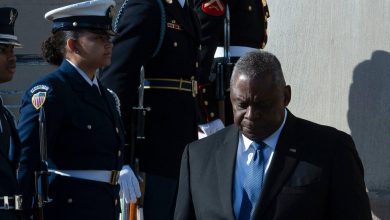Has Biden’s Top Diplomat in Mexico Gone Too Far, Officials Ask?

MEXICO CITY — Mexico’s election czar delivered a message to the American ambassador: The Mexican president was mounting an all-out assault on the national elections authority, sowing doubt about a pillar of the country’s democracy.
But instead of expressing alarm, America’s top diplomat in Mexico took up one of the president’s lines of attack, entertaining claims that an election long in the past, in 2006, had been stolen from the Mexican leader.
The ambassador, Ken Salazar, said in an interview that he was not convinced that the election was clean, challenging the stance of the United States at a time when democracy is under threat at home and across the hemisphere.
Mr. Salazar, who invited the election overseer to his residence, told The New York Times he wanted to know: “Was there fraud?”
The matter had long been settled — for Mexico’s judicial system, the European Union and the American government — until now.
This ambassador’s willingness to question the election’s legitimacy is the latest example of what several U.S. officials say is a worrying pattern, in which America’s top diplomat in Mexico has appeared to contradict his own government’s policies in the interest of aligning himself with President Andrés Manuel López Obrador.
When he took the job in September 2021, Mr. Salazar was told to prioritize building a strong relationship with Mr. López Obrador in hopes it would advance the White House’s agenda.
As the primary buffer between the United States and record-high flows of migrants, Mr. López Obrador holds enormous leverage over Mr. Biden and his presidency.
Preserving Mexico’s cooperation, administration officials said, meant avoiding conflict with a mercurial Mexican leader who had the power to damage Mr. Biden’s political future by refusing to hold the line on migration.
Mr. Salazar has in fact succeeded in getting close to the Mexican president.
But there is growing concern within the administration that the ambassador may have actually compromised U.S. interests in the process — and has not leveraged the relationship into policy wins when Mr. Biden needs them most, according to interviews with more than a dozen current and former officials and analysts.
The ambassador has rehashed debunked claims of a stolen election used by the Mexican president to fuel distrust in the country’s democracy; questioned the integrity of a U.S.-funded anticorruption nonprofit that had gone up against the president; caused a political storm by appearing to signal support for an energy overhaul the U.S. government opposed; and has stayed silent as Mr. López Obrador relentlessly attacks journalists.
In strategically important countries governed by volatile leaders, U.S. ambassadors often have to walk a fine line between cultivating a bond with the president and pushing their own government’s priorities.
Mr. Salazar insists his “direct relationship” with Mr. López Obrador benefits the United States.
Yet inside the U.S. government, some are questioning whether the administration’s soft approach is actually working — or merely emboldening Mr. López Obrador as he challenges American influence and undermines democratic safeguards, according to senior U.S. officials who were not authorized to speak publicly.
The Mexican leader has pursued an energy agenda that threatens American companies and regularly uses his bully pulpit to discredit and personally insult those who question his government.
The economy is cratering, violence continues to rage and now Mexico — not Central America — has become the biggest source of migrants arriving at the U.S. border.
Even after the ambassador’s charm offensive, the Mexican president led several leaders in boycotting a major summit hosted by the administration in June, embarrassing Mr. Biden on a global stage.
“The ambassador believes he’s close to AMLO,” said Duncan Wood, the vice president of strategy at the Wilson Center, using the Mexican leader’s nickname. “Is there anything to show for it? I can’t find anything.”
The Biden administration, Mr. Wood said, is “being played by AMLO.”
From the beginning of his tenure, Mr. Biden has had a fraught relationship with the Mexican president, who initially refused to recognize his election victory.
President Donald J. Trump, when he was in office, coerced Mr. López Obrador into executing his hard line immigration policy under the threat of tariffs, and in exchange left the Mexican leader alone to pursue his domestic agenda.
The Biden administration is just as reliant on Mexico for migration enforcement, and Mr. López Obrador’s government has dedicated significant resources to that effort, arresting a record number of migrants last year.
At the same time, though, Mr. Biden has vowed to pursue a broader agenda in the region, including defending human rights and democracy — without the heavy-handed tactics of his predecessor.
Mr. Salazar was seen as the perfect man to mollify the Mexican president. Officials assumed the former Democratic senator’s folksy manner would work well with Mr. López Obrador’s man-of-the-people persona.
“What we need to do is to address these huge, unprecedented problems together,” Mr. Salazar said. “And you can’t do it if you have an enemy.”
Mr. Salazar meets with Mexico’s leader on a regular basis, securing significant access to the country’s top power broker.
As Mr. López Obrador pursued energy overhauls, the ambassador set up meetings between the Mexican leader and U.S. companies affected. Mr. Salazar told Reuters that the U.S. government is making progress on settling disputes affecting more than $30 billion of American investment in Mexico’s energy sector.
Publicly, the Biden administration stands by Mr. Salazar.
“Some of the criticism that is levied at him is because he is engaging so actively with this government, but frankly, he’s doing it to try to advance U.S. interests,” said Juan Gonzalez, Mr. Biden’s top adviser on Latin America.
As for Mr. López Obrador’s claim that the 2006 election was stolen from him, Mr. Gonzalez confirmed in an interview that the U.S. position on the matter “has not changed,” despite the ambassador’s skepticism.
“We recognize the outcome of the election results,” Mr. Gonzalez said. “The U.S. has been on the record.”
Mr. Salazar, however, told The New York Times that he was “not aware of the U.S. government line,” and that he still had doubts: “I have been told by many people who watched the vote that night, including people that have no ax to grind, who are very credible people, that there was fraud.”
It is episodes like these that have stoked concerns among U.S. officials who say that the ambassador may have gone too far. At times, he has caused confusion about the U.S. position on some of the most sensitive policy issues.
Weeks after Jennifer Granholm, the U.S. energy secretary, flew to Mexico to express concern about the energy changes, Mr. Salazar appeared to contradict her message, telling Mexican journalists that “the president is right” to pursue changes to the law.
The comment, which Mr. Salazar said was taken out of context, was marshaled by Mr. López Obrador to signal the ambassador’s support for legislation that would boost Mexico’s state-owned electrical utility and jeopardize billions in U.S. investments.
In March, the Mexican president invited the ambassador to join him at his daily news conference, where he takes the stage to push government talking points and assail anyone he considers an adversary — including the U.S. government.
Mr. Salazar wanted to attend, he told The Times, but his staff urged him to reconsider, arguing that standing by Mr. López Obrador during one of his tirades would be risky for the Biden administration.
Eventually, the potential awkwardness was avoided by what the ambassador said was a “scheduling conflict.”
Earlier this year, one prominent civic leader wrote to Mr. Salazar seeking support against Mr. López Obrador’s attacks on advocacy groups. The leader, María Amparo Casar, was then summoned to Mr. Salazar’s residence.
Ms. Casar’s nonprofit, Mexicans Against Corruption and Impunity, investigates graft and is a regular target of Mr. López Obrador’s scorn.
The president had also assailed the U.S. government for funding the group, which was co-founded by a businessman who left the organization to form an opposition movement.
A senior Biden administration official had already told Mr. Salazar that the administration would not pull financing for the organization, said two U.S. officials who were not authorized to speak publicly.
But in the lead-up to the meeting, he told his staff he had grown suspicious of the group and wanted to investigate it.
The ambassador told The Times he believed the opposition activism of the group’s founder “created the appearance of impropriety” and said he would “advocate for the funding to be cut” if he found charges of political activity to be credible.
At the meeting, Mr. Salazar grilled Ms. Casar, questioning whether her group was secretly involved in politics. Ms. Casar, shocked, said no, explaining that U.S. government auditors had determined over and over again that the group was not involved in politics.
“Why should I believe you?” the ambassador then asked, according to two people familiar with the meeting who asked not to be named for fear of reprisal.
“The only proof I have is my word,” Ms. Casar answered. The ambassador told her that “this doesn’t smell good,” before abruptly rising and cutting the meeting short.
Mr. Salazartold The Times he had every right to raise “legal and ethical” issues with a recipient of U.S. funding, adding, “Somebody can tell you a lot of things that just aren’t true.”
Mr. Gonzalez told The Times that the American government would continue to fund Ms. Casar’s group. “The policy of the U.S. is clear on this,” he said.
All of the political capital the ambassador has tried to build with Mexico’s president was not enough to stop him from delivering a humiliating rebuke to Mr. Biden last month.
In the lead up to a key regional summit hosted by the administration in June, the Mexican president repeatedly bashed the United States for not inviting Cuba, Nicaragua or Venezuela.
Mr. Salazar pleaded with him to attend, said a U.S. Embassy official who requested anonymity to avoid reprisal, but Mr. López Obrador kept threatening to boycott the event, and a wave of countries followed suit.
In a last-ditch effort at diplomacy, the ambassador paid a visit to Mexico’s most important religious site, a shrine to the Virgin of Guadalupe, the day before the summit was set to begin.
“I pray at the Basilica to the Patroness of the Americas to lift up our leaders to chart a new transformative era for the Americas and the US-Mexico relationship,” Mr. Salazar posted on Twitter.
Mr. López Obrador officially dropped out of the event the next day.





